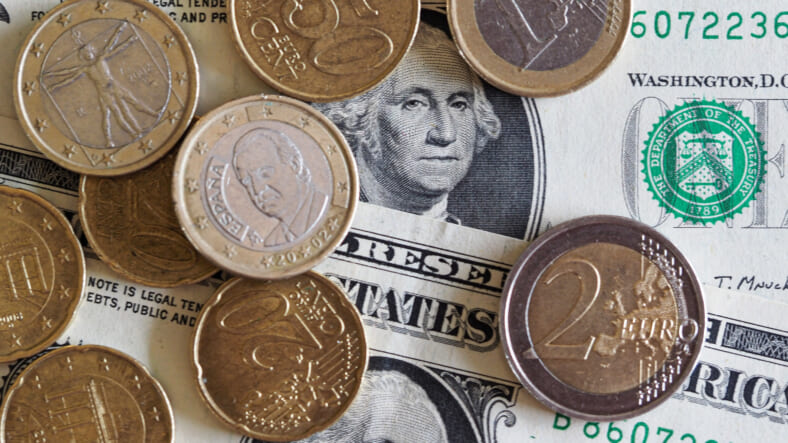The euro to dollar decline: How it could impact U.S. consumers and travelers
“In general, the parity between the two currencies opens the door for travel experiences in Europe that would be cheaper than they were before for American travelers,” Kent W. Johnson, co-founder of Black & Abroad, told theGrio.
The euro, along with the U.S. dollar, are among the largest reserve currencies in the world and the euro is the second-most traded currency after the dollar. For the past two decades, the euro has eclipsed the dollar, but parity between the currencies was reached this week and sparked conversations on inflation, and what this means for America and global markets at large.

Bloomberg has kept close tabs on the rapidly tumbling euro, which fell to $0.9998. The outlet noted that the currency’s woes are attributed to several factors, including the ongoing war in Ukraine and the threat of Russia halting oil exports to several nations within the eurozone. Further, the eurozone is enduring record inflation approaching 9%, and other major currencies such as the yen and sterling are also weaker against the dollar.
The Federal Reserve, aiming to combat the U.S. inflation rate of 9.1%, hiked interest rates by 0.75%, its largest hike since 1994. This has made the dollar attractive as a safe-haven investment, meaning investors can hold cash at value in the short term without gains they would normally see in Treasury bonds, precious metals, utility stocks, or Treasury exchange-traded funds (EFTs).
This strategy often occurs during bear market periods as investors seek to stave off deep financial losses and impacts on their portfolios. The Fed’s eurozone counterpart, the European Central Bank (ECB), is expected to hike rates during its July 21 meeting, mirroring the practice taking place in the U.S. to stave off recession.
Another distinct byproduct of the euro’s decline will be enjoyed by American travelers across the eurozone. With the exchange rate at 1:1, the dollar will net Americans more value not seen since the early days of the euro, which was just established in 1999. The last time these currencies enjoyed an equal exchange rate was in 2002.
“In general, the parity between the two currencies opens the door for travel experiences in Europe that would be cheaper than they were before for American travelers,” Kent W. Johnson, chief strategy officer and co-founder at Black & Abroad, told theGrio.

“To truly capitalize on the savings, travelers should be opting to pay for things like hotels and tours in full (as opposed to reserving now and paying upon arrival), as there’s no guarantee that the dollar & euro will remain this close in value for long.”
For those not traveling, Kent noted that others will see prices for certain imported items become more affordable when shopping. “All in all, the euro becoming equal to (or in some cases, lesser than) the dollar benefits Americans both home and when traveling to Europe,” he said.
The dollar still enjoys a largely favorable exchange rate in other nations across the Western Hemisphere, but the volatility of the market will eventually stabilize although a timetable is difficult to determine.
Sharif Muhammad of the Association of African American Financial Advisors told theGrio that the macroeconomic effect of a weakened Euro “produces both winners and losers from both a business operation and consumer standpoint.”
“If we keep the conversation limited to consumers, we would see winners in U.S. consumers who purchase imported goods, as the exchange rate drop makes the products more affordable. So, items such as designer clothes, shoes, etc. are now cheaper and more affordable,” said Muhammad. He said European cars should also cost less for consumers.

Travelers going on vacation in Europe will be “pleasantly surprised by the increase in purchasing power that their dollars have against a weak Euro,” noted Muhammad. The financial advisor also said that expats who work on Euro-based assignments and are paid in U.S. dollars should also get a bump in their quality of living.
However, there are negative impacts to the euro’s decline. “Domestic companies that have significant export operations to countries in Europe will see sales slump, which can lead to reductions in production and domestic layoffs,” said Muhammad.
Moreover, he said that the U.S. tourism industry will also see a reduction in travelers from Europe, which will adversely affect the profitability and job prospects in this space.
“While it may provide a mild reprieve, a weakening euro does little to stem the pain felt by U.S. consumers in this environment of unbridled inflation,” he noted.
TheGrio is FREE on your TV via Apple TV, Amazon Fire, Roku and Android TV. Also, please download theGrio mobile apps today!


